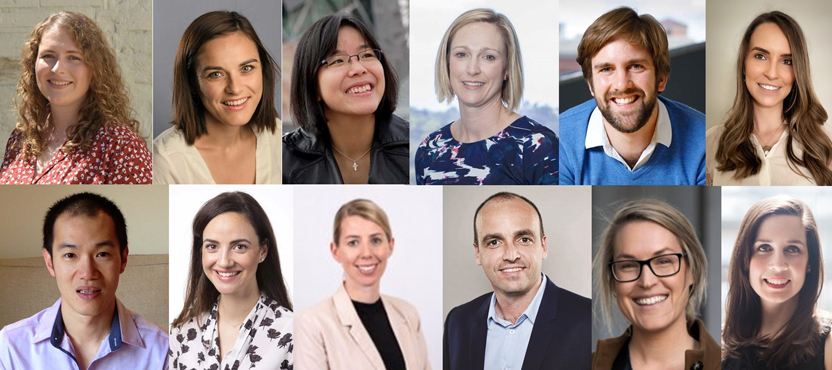
Associate Professor Francine Marques
Emerging Leaders Committee Chair
Dr Dean Picone
CV Champions Co-program Manager
On behalf of the Australian Cardiovascular Alliance Emerging Leaders Committee
The Australian Cardiovascular Alliance (ACvA) was established in 2015. The main purpose of the Alliance is to increase awareness of cardiovascular diseases in the Australian community and within governments, and work with the entire cardiovascular ecosystem to ensure more cardiovascular research is undertaken and its impact is recognised and enhanced.
In order to achieve this, one of the strategic objectives of the ACvA is to promote the development of strong collaborative networks between cardiovascular (CV) researchers throughout Australia.
In 2018, the Emerging Leaders Committee (ELC) of the ACvA was formed. One of the key objectives of the committee is to provide opportunities for networking, development of collaborations and activities to support the retention of early- and mid-career cardiovascular researchers. Under these objectives, the Cardiovascular (CV) Champions Program was developed.
When the ELC members were developing the CV Champions program, they looked at many different structures and models that were offered by companies in Australia. However, no model was suited to what the ELC wanted to achieve. That is because the ELC believed that building in a networking aspect in the program was essential to support the CV community to build strong links with each other, creating a stronger ecosystem.
Originally, the CV Champions Program was conceived of as a face-to-face group activity. However, due to the pandemic, it became evident that the program would need to be moved online, which made delivering on the networking objective more difficult. The ELC also recognised that science communication skills are developed over time, allowing participants to reflect on lessons learnt and providing opportunities to put them into practice. As such, the ELC welcomed the partnership with Dr Hannah Brown, which allowed the development of a tailored program that was suited to our research community.
The resulting CV Champions program is year-long and aims to provide advanced communication skills to emerging CV researchers. This will equip the CV Champions with the tools to actively and effectively engage with the general public and the scientific community to ‘champion’ the importance of cardiovascular research and to become the sector and their own best advocates. The program is facilitated by Dr Brown, who is a leading science communicator and the Science Strategy and Operations Manager at the Victorian Heart Institute. Each month, the CV Champions engage in a 90-minute online training session, covering all aspects of communications. Some of the sessions to date have included listening and sharing, engaging with different audiences, storytelling, and developing exciting social media content. The CV Champions are regularly paired up for monthly homework tasks, which also provides a great opportunity for networking with other early- and mid-career researchers from around Australia.
We have 51 CV Champions selected from our EMCR community, covering every state and territory (with exception of the Northern Territory) and different fields of research (discovery, public health and clinical sciences). Over 70% of participants are female. The feedback so far on the program has been overwhelmingly positive, from the networking opportunities to specific comments on skills learned.
Based on our experience, the ELC found that researchers are usually well-trained to do science and talk about science with their immediate peers. However, many do not have the skills or confidence to communicate science with key stakeholders in the sector. Considering that Australian research is largely funded by government bodies (i.e. taxpayers’ money) and philanthropy and charities (i.e. donations), we believe our scientific community must provide researchers with opportunities to improve their communication skills. Besides generating new career opportunities, these skills will empower our community to increase their visibility and demonstrate the impact of their work. This may also help us, as a sector, to achieve a greater share of the funding available, advocate for further research funding based on our impact, and advocate for improved opportunities for research translation and implementation.
By bringing scientists together, we also develop nationwide networking opportunities—something most of us have been craving during the pandemic. This can facilitate new collaborations and create opportunities for our research communities.
The first step is to build a network of likeminded individuals who are driven to put in the work to develop a program, and can help you support, manage and promote the initiative. This could be organised via your society or institution, for example. You need to consider time and costs involved, and whether sponsorship is a possibility.
The second step is to define the purpose of the program—why is the program needed for your STEM community? What are the skills you think your community is missing? How would you deliver these skills, and who would have access to the training?
The third step (and perhaps the most crucial one) is to find a ‘champion’ to support your cause. For us, Dr Hannah Brown has been our champion, and has gone above and beyond to develop and drive the program.
We are grateful to Hannah for the time she has taken to help us with the CV Champions, the ACvA Board for supporting our initiative, and our cardiovascular research community for coming together and creating a fabulous network of true champions!
© 2025 Australian Academy of Science